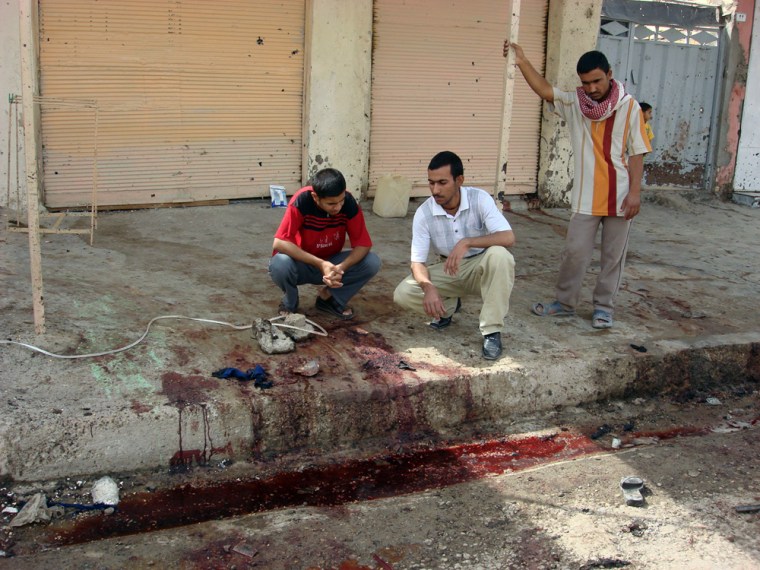The U.S. military on Friday blamed al-Qaida in Iraq for a double suicide bombing that killed at least 35 people during a wedding procession through a crowd of people cheering the bride and groom in a town northeast of Baghdad.
The attack Thursday evening came amid heightened worries that al-Qaida militants are regrouping, despite recent security gains by U.S.-led forces. The terror network announced April 19 that it was launching a one-month offensive against U.S. troops and U.S.-allied Sunnis.
“Al-Qaida in Iraq continues their malicious tactics against the people of Iraq and their way of life,” the military said in a statement. “They seek violence and chaos in Iraq.”
Thursday’s blasts occurred in Balad Ruz, a predominantly Shiite Muslim town 45 miles northeast of Baghdad. An Iraqi female suicide bomber imitating pregnancy detonated the first bomb, the military said. A male bomber also blew himself up.
The woman bomber blew herself up as people were dancing and clapping while members of the passing wedding party played music. The male bomber attacked minutes later as police and ambulances arrived at the scene, said Maj. Gen. Abdul-Karim al-Rubaie, head of the Diyala provincial operations center that oversees Balad Ruz.
The two explosions tore through the stalls and stores that lined the area. Al-Rubaie said at least 35 people were killed and 65 were wounded, including the bride and groom.
The U.S. military gave a lower casualty toll, however, of 31 dead and 52 wounded, including children.
Women increasingly used as bombers
Diyala has been a flashpoint in the battle against al-Qaida in Iraq, which the U.S. military says has been increasingly using women as suicide bombers. Explosive belts are easier to conceal under female clothing and women are often not treated with the same suspicion as men.
Two suicide bombings staged by women last week in Diyala killed a dozen people.
Lt. Gen. Lloyd J. Austin III, the No. 2 U.S. commander, said last week that al-Qaida in Iraq was trying to regroup after suffering a devastating blow last year when thousands of Sunni tribesmen turned against the terrorist group blamed for most of Iraq’s car bombings and suicide attacks.
Thursday’s suicide attacks came hours after a bomb-rigged parked car exploded in the capital when a U.S. patrol went by in a crowded area, killing a U.S. soldier and at least nine Iraqis. The attack also wounded 26 Iraqis and two American soldiers.
The soldier’s death in the attack raised to at least 4,064 the number of U.S. military personnel who have died since the Iraq war started in March 2003, according to an Associated Press count.
Sadr City fighting intensifies
U.S. soldiers also find themselves facing intensified fighting with Shiite extremists, particularly in Baghdad’s militia stronghold of Sadr City.
Twelve people were wounded in overnight clashes in Sadr City, police and health officials said.
The U.S. military charges that Iranian-backed special forces are leading the attacks against U.S.-led forces in Sadr City. Iraq’s government has sent a delegation of five Shiite politicians to Iran carrying documents and other material they claim indicates Tehran is supplying weapons and training for Shiite militiamen who are fighting U.S. and Iraqi troops.
Iran denies it is fueling violence in Iraq, saying it trying to promote stability in the neighboring country.
Fighting in Sadr City — a base for the Mahdi Army militia — intensified after anti-American cleric Muqtada al-Sadr threatened last week to wage “open war” on U.S.-led troops.
Meanwhile, an Air Force MQ-1 Predator unmanned drone crashed early Friday northwest of Balad, about 50 miles north of Baghdad, the military said. It said mechanical failure was suspected in the crash.
The U.S. military has several unmanned MQ-1 Predators doing surveillance over Iraq. They have become mainstays of the U.S. war effort, offering round-the-clock surveillance of road convoys, nighttime insurgent movements via infrared sensors, and occasionally unleashing one of their two Hellfire missiles on a target.
